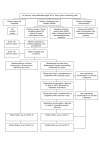The effectiveness and cost-effectiveness of opportunistic screening and stepped care interventions for older hazardous alcohol users in primary care (AESOPS) - a randomised control trial protocol
- PMID: 18549492
- PMCID: PMC2442836
- DOI: 10.1186/1472-6963-8-129
The effectiveness and cost-effectiveness of opportunistic screening and stepped care interventions for older hazardous alcohol users in primary care (AESOPS) - a randomised control trial protocol
Abstract
Background: There is a wealth of evidence regarding the detrimental impact of excessive alcohol consumption. In older populations excessive alcohol consumption is associated with increased risk of coronary heart disease, hypertension, stroke and a range of cancers. Alcohol consumption is also associated with an increased risk of falls, early onset of dementia and other cognitive deficits. Physiological changes that occur as part of the ageing process mean that older people experience alcohol related problems at lower consumption levels. There is a strong evidence base for the effectiveness of brief psychosocial interventions in reducing alcohol consumption in populations identified opportunistically in primary care settings. Stepped care interventions involve the delivery of more intensive interventions only to those in the population who fail to respond to less intensive interventions and provide a potentially resource efficient means of meeting the needs of this population.
Methods/design: The study design is a pragmatic prospective multi-centre two arm randomised controlled trial. The primary hypothesis is that stepped care interventions for older hazardous alcohol users reduce alcohol consumption compared with a minimal intervention at 12 months post randomisation. Potential participants are identified using the AUDIT questionnaire. Eligible and consenting participants are randomised with equal probability to either a minimal intervention or a three step treatment approach. The step treatment approach incorporates as step 1 behavioural change counselling, step 2 three sessions of motivational enhancement therapy and step 3 referral to specialist services. The primary outcome is measured using average standard drinks per day and secondary outcome measures include the Drinking Problems Index, health related quality of life and health utility. The study incorporates a comprehensive economic analysis to assess the relative cost-effectiveness of the interventions.
Discussion: The paper presents a protocol for the first pragmatic randomised controlled trial evaluating the effectiveness and cost-effectiveness of stepped care interventions for older hazardous alcohol users in primary care.
Trial registration: ISRCTN52557360.
References
-
- Academy of Medical Sciences Calling Time: The Nation's Drinking as a major health Issue. London. 2004.
-
- Department of Health . Sensible Drinking. The Report of an Inter-departmental Working Group. London, Department of Health; 1995.
-
- Wright F, Whyley C. Accident prevention and risk taking by elderly people: The need for advice. Age Concern, London; 1994.
-
- Royal College of Physicians . Alcohol. Can the NHS afford it? RCP, London; 2002.
Publication types
MeSH terms
Associated data
Grants and funding
LinkOut - more resources
Full Text Sources
Medical


